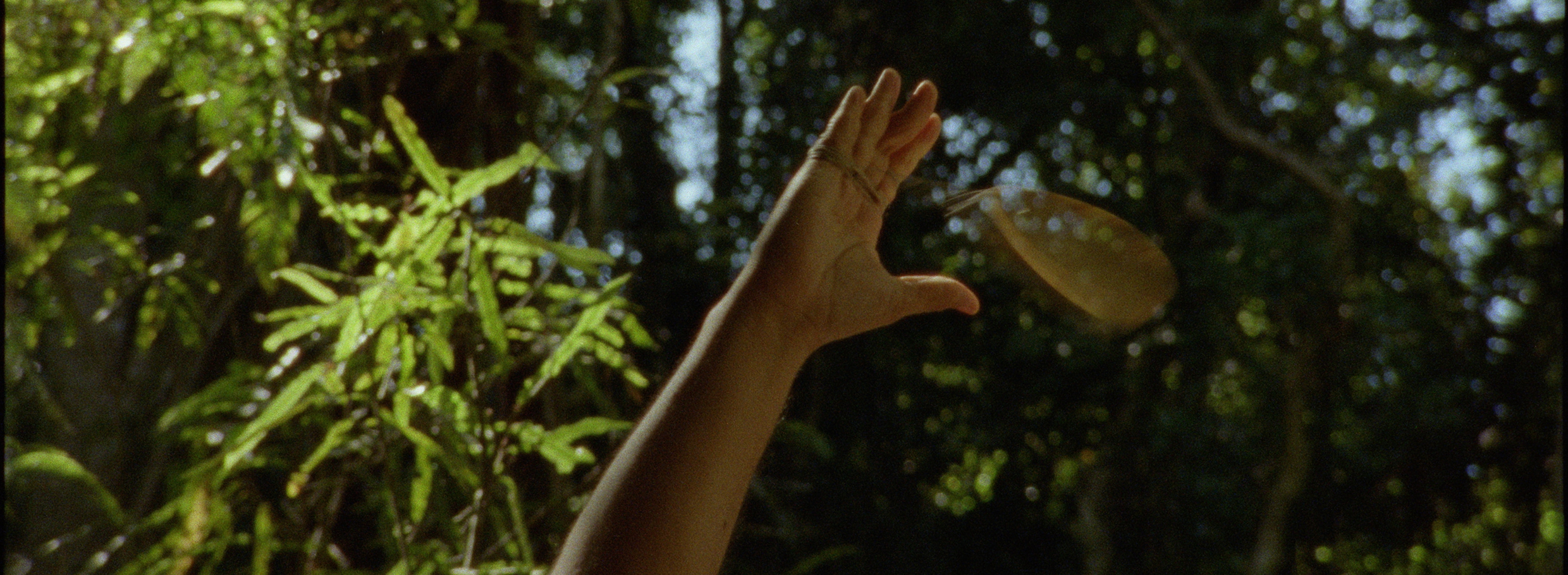
Aura Satz: A Pluriverse Siren
‘A Pluriverse Siren’ re-imagines the siren in order to forge a new understanding of present and long term emergencies. Part of Aura Satz’s documentary film Preemptive Listening (2017-ongoing), this chapter of the project features the voice of Erin Matariki Carr, lawyer, scholar and activist, Co-Lead for RIVER (Revitalising Indigenous Virtues for Earth’s Regeneration) and Taonga Pūoro performance and music by Horomona Horo.
The siren serves as a worldwide symbol of potential trauma, an emblem warning of climate catastrophe, a mouthpiece for sonic governance and crisis management. The film invokes an alternative reading of the siren by connecting to Te Ao Māori ancestral knowledge, weaving Taonga Pūoro with the sounds of the natural environment at Sanctuary Mountain Maungatautari. These traditional Māori instruments can act as a call to arms, a warning, as well as a form of long distance communication, a signal heralding a birth or the dawn of a new day. The film asks: What might a siren for the non-human or more than human sound like? Can we envision new sounds not only scored to immediacy, but signals sounding the alarm for the distant future, the cries on the cusp of ecological catastrophe? Have we internalized the siren’s cry? Through Matariki’s words on kinship and close-ups of Horomona’s Taonga Pūoro practice, the film highlights the importance of listening and reattuning to a pluriverse siren, one that can speak to many interconnected worldviews.
–
Aura Satz (b. 1974, Barcelona) is a London-based artist who works with film, sound, performance and sculpture. Her works explore a distributed, expanded and shared notion of voice, and are made in conversation, using dialogue as both method and subject matter. Satz has made several audiovisual portraits of listening and compositional practices as well as works centred on sound technology and unusual notation systems. She is currently developing her first feature film, ‘Preemptive Listening,’ an experimental documentary on emergency signals and sirens, with support from Walker Arts Centre, Kunsternes Hus, Tate Modern, and EMPAC, funded by an AHRC fellowship hosted at the Royal College of Art.
She has performed, exhibited and screened her work internationally, including Tate Modern, BFI Southbank, Hayward Gallery, Sydney Biennale, NTT InterCommunication Center Tokyo, High Line Art NY, the Rotterdam Film Festival, MoMA NY, Sharjah Art Foundation, Kadist San Francisco, Onassis Stegi, and Sonic Acts. She has presented solo exhibitions at the WellcomeCollection; the Hayward Gallery project space; John Hansard Gallery; George Eastman Museum; Dallas Contemporary; ARTIUM, Museo Vasco de Arte Contemporáneo; KunstnernesHus; as well as special screening programmes at the Rotterdam Film Festival, The New York Film Festival, Tate Britain, Whitechapel Gallery and more. Her films are distributed by LUX.
Horomona Horo (b. 1978 Ngā Puhi, Ngāti Porou, Taranaki, English Devon, MacGregor Scotland) is a New Zealand Māori musician and composer. He is a practitioner of taonga pūoro, the collective term for Māori traditional musical instruments of which, include an array of flutes, trumpets and percussive instruments. Horo was mentored by the late Dr Hirini Melbourne and Dr Richard Nunns and was the winner of the inaugural Dynasty Heritage Concerto Competition in 2001. Horomona has developed his mastery and skill of not only the performance practice of taonga puoro, but has continued the vision of the renaissance of the traditional Māori musical instruments by his mentors and has extended his knowledge and skills across diverse music and art genres. His extensive history in performance and collaborative work spans over 20 years, during this time he has worked with a vast array of creative disciplines and genre as well as recently completing artist residencies at Government House NZ & Brandeis University (USA). Horomona’s work features alongside NZ & international artists such as Maisey Rika, Dame Gillian Whitehead, Black Arm Band, QSO, Small Island Big Song (to name a few). Events include WOMAD, The Rainforest Festival (Borneo), WOMEX, Rugby & Cricket World Cups, Olympic & Commonwealth Games, The Celtic Festival, Jazz & Blues Festival (Australia), and many more. He is the Director of Orowaru Arts and Kai Arahi with Haumanu Collective.
Erin Matariki Carr (Ngāti Awa, Ngāi Tūhoe, Welsh, Croatian, English) lives in Tāneatua in the east of the North Island of Aotearoa New Zealand. Matariki is a lawyer working within the intergenerational movement of Māori resistance that is now surging towards constitutional transformation in honour of the treaty Te Tiriti o Waitangi 1840 between the British Crown and sovereign hapū Māori. An important story in this movement has been the granting of legal personality to Te Urewera rainforest, the homelands of Ngāi Tūhoe. Here, Tūhoe aims to “disrupt the false notion of human superiority over the land” by removing human ownership and management, and providing a new kawa (or law) that starts with “human management for the benefit of the land”. Erin Matariki Carr previously worked as Manager of Planning & Design to create and implement policies under the world-first legislation conferring legal personhood to the Te Urewera rainforest. Matariki is currently a project lead at RIVER (Revitalising Indigenous Virtues for Earth’s Regeneration), where she focuses on the constitutional transformation movement in Aotearoa with a number of other teams, including Tūmanako Consultants and TeKuaka NZA, and as a Research Fellow at the University of Auckland Faculty of Law.
Special thanks to Tendai Mutambu.
29 July - 03 September 2023